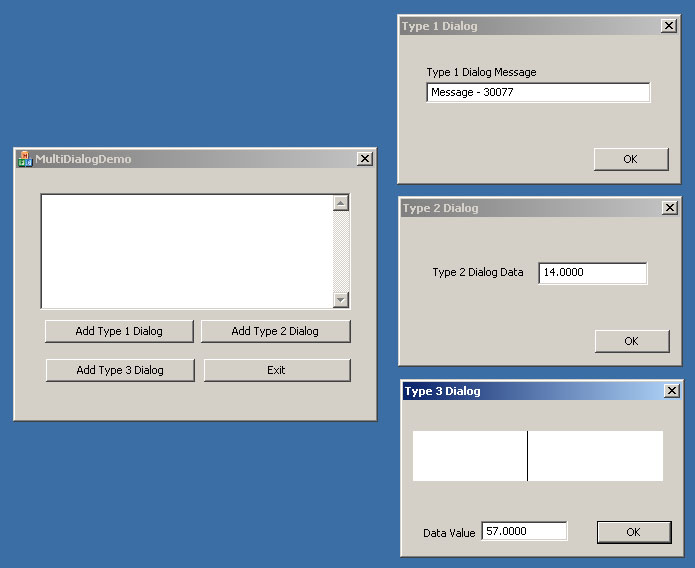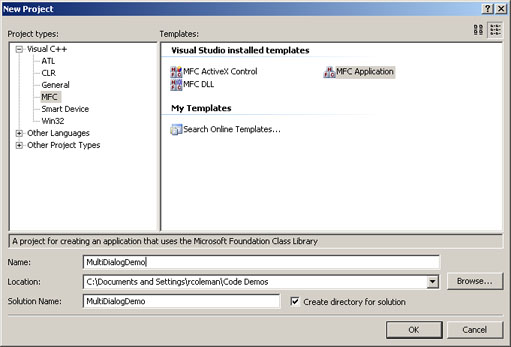 Figure 1
Figure 1
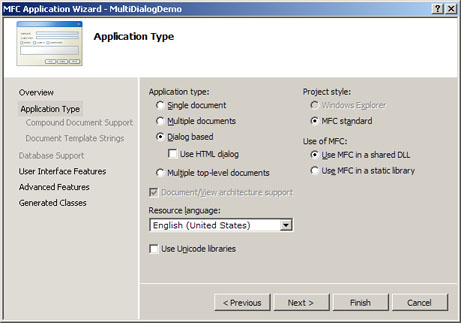 Figure 2
Figure 2
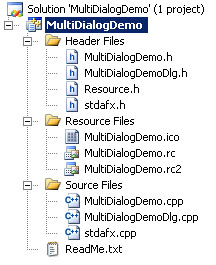 Figure 3
Figure 3
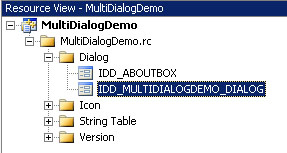 Figure 4
Figure 4
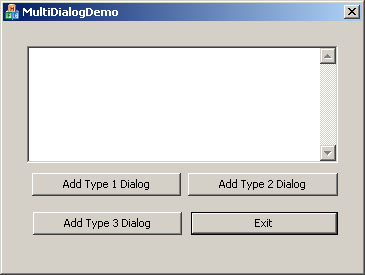
Figure 5
 Figure 1
Figure 1
 Figure 2
Figure 2
 Figure 3
Figure 3
 Figure 4
Figure 4

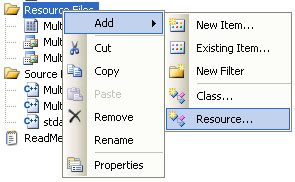
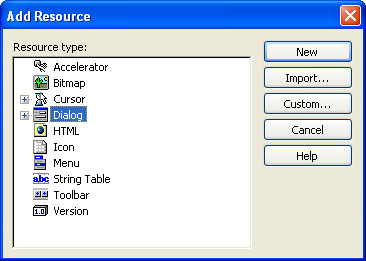
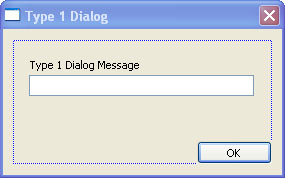
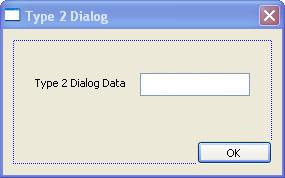
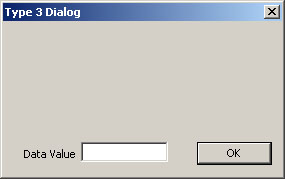
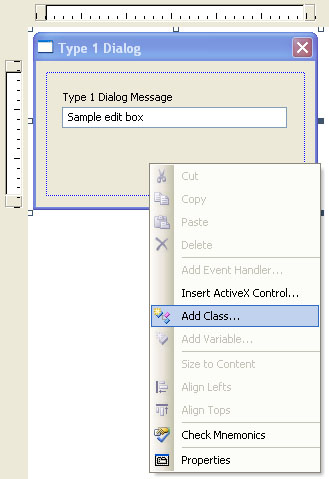
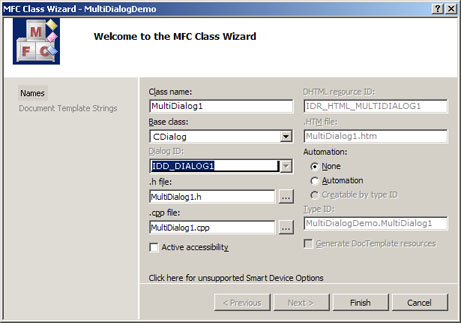
//------------------------------------------------ Code changes appear here... //------------------------------------------------
// MultiDialogDemoDlg.h : header file
//
#pragma once
//---------------------------------------------------
#include <vector>
#include "MultiDialog1.h"
#include "MultiDialog2.h"
#include "MultiDialog3.h"
using namespace std;
//---------------------------------------------------
// CMultiDialogDemoDlg dialog
class CMultiDialogDemoDlg : public CDialog
{
// Construction
public:
CMultiDialogDemoDlg(CWnd* pParent = NULL); // standard constructor
// Dialog Data
enum { IDD = IDD_MULTIDIALOGDEMO_DIALOG };
protected:
virtual void DoDataExchange(CDataExchange* pDX); // DDX/DDV support
// Implementation
protected:
HICON m_hIcon;
// Generated message map functions
virtual BOOL OnInitDialog();
afx_msg void OnSysCommand(UINT nID, LPARAM lParam);
afx_msg void OnPaint();
afx_msg HCURSOR OnQueryDragIcon();
DECLARE_MESSAGE_MAP()
//---------------------------------------------------
// These are the two event handler functions added
// when the buttons on the dialog were double clicked
// from the resource editor.
public:
afx_msg void OnBnClickedButton1();
afx_msg void OnBnClickedButton2();
afx_msg void OnBnClickedButton3();
// You must manually add the next line
afx_msg void OnTimer (UINT TimerVal);
// Vectors to hold pointers to each of the types of dialog boxes
private:
vector<MultiDialog1 *> m_vDialog1;
vector<MultiDialog2 *> m_vDialog2;
vector<MultiDialog3 *> m_vDialog3;
//---------------------------------------------------
};
// MultiDialogDemoDlg.cpp : implementation file
//
#define _CRT_SECURE_NO_WARNINGS
#include "stdafx.h"
#include "MultiDialogDemo.h"
#include "MultiDialogDemoDlg.h"
//------------------------------------------------------
#include "MultiDialog1.h"
#include "MultiDialog2.h"
#include "MultiDialog3.h"
#include <math.h>
#include <time.h>
//------------------------------------------------------
#ifdef _DEBUG
#define new DEBUG_NEW
#endif
// CAboutDlg dialog used for App About
class CAboutDlg : public CDialog
{
public:
CAboutDlg();
// Dialog Data
enum { IDD = IDD_ABOUTBOX };
protected:
virtual void DoDataExchange(CDataExchange* pDX); // DDX/DDV support
// Implementation
protected:
DECLARE_MESSAGE_MAP()
};
CAboutDlg::CAboutDlg() : CDialog(CAboutDlg::IDD)
{
}
void CAboutDlg::DoDataExchange(CDataExchange* pDX)
{
CDialog::DoDataExchange(pDX);
}
BEGIN_MESSAGE_MAP(CAboutDlg, CDialog)
END_MESSAGE_MAP()
// CMultiDialogDemoDlg dialog
CMultiDialogDemoDlg::CMultiDialogDemoDlg(CWnd* pParent /*=NULL*/)
: CDialog(CMultiDialogDemoDlg::IDD, pParent)
{
m_hIcon = AfxGetApp()->LoadIcon(IDR_MAINFRAME);
}
void CMultiDialogDemoDlg::DoDataExchange(CDataExchange* pDX)
{
CDialog::DoDataExchange(pDX);
}
BEGIN_MESSAGE_MAP(CMultiDialogDemoDlg, CDialog)
ON_WM_SYSCOMMAND()
ON_WM_PAINT()
ON_WM_QUERYDRAGICON()
//}}AFX_MSG_MAP
ON_BN_CLICKED(IDC_BUTTON1, &CMultiDialogDemoDlg::OnBnClickedButton1)
ON_BN_CLICKED(IDC_BUTTON2, &CMultiDialogDemoDlg::OnBnClickedButton2)
ON_BN_CLICKED(IDC_BUTTON3, &CMultiDialogDemoDlg::OnBnClickedButton3)
//------------------------------------------------------
// Add a catch for the timer event
ON_WM_TIMER (&CMultiDialogDemoDlg::OnTimer)
//------------------------------------------------------
END_MESSAGE_MAP()
// CMultiDialogDemoDlg message handlers
BOOL CMultiDialogDemoDlg::OnInitDialog()
{
CDialog::OnInitDialog();
// Add "About..." menu item to system menu.
// IDM_ABOUTBOX must be in the system command range.
ASSERT((IDM_ABOUTBOX & 0xFFF0) == IDM_ABOUTBOX);
ASSERT(IDM_ABOUTBOX < 0xF000);
CMenu* pSysMenu = GetSystemMenu(FALSE);
if (pSysMenu != NULL)
{
CString strAboutMenu;
strAboutMenu.LoadString(IDS_ABOUTBOX);
if (!strAboutMenu.IsEmpty())
{
pSysMenu->AppendMenu(MF_SEPARATOR);
pSysMenu->AppendMenu(MF_STRING, IDM_ABOUTBOX, strAboutMenu);
}
}
// Set the icon for this dialog. The framework does this automatically
// when the application's main window is not a dialog
SetIcon(m_hIcon, TRUE); // Set big icon
SetIcon(m_hIcon, FALSE); // Set small icon
// TODO: Add extra initialization here
//------------------------------------------------------
srand((unsigned int)(time(NULL))); // Seed the random number generator
// Create a 1 second timer
CWnd::SetTimer(1, 1000, 0);
//------------------------------------------------------
return TRUE; // return TRUE unless you set the focus to a control
}
void CMultiDialogDemoDlg::OnSysCommand(UINT nID, LPARAM lParam)
{
if ((nID & 0xFFF0) == IDM_ABOUTBOX)
{
CAboutDlg dlgAbout;
dlgAbout.DoModal();
}
else
{
CDialog::OnSysCommand(nID, lParam);
}
}
// If you add a minimize button to your dialog, you will need the code below
// to draw the icon. For MFC applications using the document/view model,
// this is automatically done for you by the framework.
void CMultiDialogDemoDlg::OnPaint()
{
if (IsIconic())
{
CPaintDC dc(this); // device context for painting
SendMessage(WM_ICONERASEBKGND, reinterpret_cast<WPARAM>(dc.GetSafeHdc()), 0);
// Center icon in client rectangle
int cxIcon = GetSystemMetrics(SM_CXICON);
int cyIcon = GetSystemMetrics(SM_CYICON);
CRect rect;
GetClientRect(&rect);
int x = (rect.Width() - cxIcon + 1) / 2;
int y = (rect.Height() - cyIcon + 1) / 2;
// Draw the icon
dc.DrawIcon(x, y, m_hIcon);
}
else
{
CDialog::OnPaint();
}
}
// The system calls this function to obtain the cursor to display while the user drags
// the minimized window.
HCURSOR CMultiDialogDemoDlg::OnQueryDragIcon()
{
return static_cast<HCURSOR>(m_hIcon);
}
void CMultiDialogDemoDlg::OnBnClickedButton1()
{
// TODO: Add your control notification handler code here
//------------------------------------------------------
MultiDialog1 *dlg = new MultiDialog1(); // Instantiate the class
dlg->Create(IDD_DIALOG1, NULL); // Create the dialog box
dlg->ShowWindow(SW_SHOWNORMAL); // Show it
string s = "Initial message"; // Create start message
dlg->setMessage(s); // Set an initial message value
dlg->display();
m_vDialog1.push_back(dlg); // Add it to the vector
//------------------------------------------------------
}
void CMultiDialogDemoDlg::OnBnClickedButton2()
{
// TODO: Add your control notification handler code here
//------------------------------------------------------
MultiDialog2 *dlg = new MultiDialog2(); // Instantiate the class
dlg->Create(IDD_DIALOG2, NULL); // Create the dialog box
dlg->ShowWindow(SW_SHOWNORMAL); // Show it
dlg->setData((double)(rand() % 100)); // Set an initial data value
dlg->display();
m_vDialog2.push_back(dlg); // Add it to the vector
//------------------------------------------------------
}
void CMultiDialogDemoDlg::OnBnClickedButton3()
{
//------------------------------------------------------
// TODO: Add your control notification handler code here
//------------------------------------------------------
MultiDialog3 *dlg = new MultiDialog3(); // Instantiate the class
dlg->Create(IDD_DIALOG3, NULL); // Create the dialog box
dlg->ShowWindow(SW_SHOWNORMAL); // Show it
// dlg->setData((double)(rand() % 100)); // Set an initial data value
// dlg->display();
m_vDialog3.push_back(dlg); // Add it to the vector
OnPaint();
}
//------------------------------------------------------
void CMultiDialogDemoDlg::OnTimer(UINT nIDEvent)
{
// Update the data in all of the dialog1 objects
for(vector<MultiDialog1 *>::iterator it=m_vDialog1.begin();
it != m_vDialog1.end(); it++)
{
// Create a random message
string msg = "Message - ";
char str[32];
int val = rand();
sprintf(str, "%d", val);
msg.append(str);
(*it)->setMessage(msg);
(*it)->display();
}
// Update the data in all of the dialog2 objects
for(vector<MultiDialog2 *>::iterator it=m_vDialog2.begin();
it != m_vDialog2.end(); it++)
{
// Decrement by 1.0 the data in each dialog2
// If it drops to 0 or below reset to another random value
double d = (*it)->getData();
if(d > 0.0) d-= 1.0;
if(d <= 0.0) d = (double)(rand() % 100);
(*it)->setData(d);
(*it)->display();
}
// Update the data in all of the dialog3 objects
for(vector<MultiDialog3 *>::iterator it=m_vDialog3.begin();
it != m_vDialog3.end(); it++)
{
// Decrement by 1.0 the data in each dialog3
// If it drops to 0 or below reset to another random value
double d = (*it)->getData();
if(d > 0.0) d-= 1.0;
if(d <= 0.0) d = (double)(rand() % 100);
(*it)->setData(d);
(*it)->display();
}
CDialog::OnTimer(nIDEvent); // Pass on to super
}
//------------------------------------------------------
#pragma once
//--------------------------------------------------------
#include <string>
using namespace std;
//--------------------------------------------------------
// MultiDialog1 dialog
class MultiDialog1 : public CDialog
{
DECLARE_DYNAMIC(MultiDialog1)
public:
MultiDialog1(CWnd* pParent = NULL); // standard constructor
virtual ~MultiDialog1();
//--------------------------------------------------------
// Display message function
void display();
void setMessage(string msg);
private:
string m_sMessage;;
//--------------------------------------------------------
// Dialog Data
enum { IDD = IDD_DIALOG1 };
protected:
virtual void DoDataExchange(CDataExchange* pDX); // DDX/DDV support
DECLARE_MESSAGE_MAP()
};
// MultiDialog1.cpp : implementation file
//
#include "stdafx.h"
#include "MultiDialogDemo.h"
#include "MultiDialog1.h"
// MultiDialog1 dialog
IMPLEMENT_DYNAMIC(MultiDialog1, CDialog)
MultiDialog1::MultiDialog1(CWnd* pParent /*=NULL*/)
: CDialog(MultiDialog1::IDD, pParent)
{
//------------------------------------------------------
m_sMessage = ""; // Initialize the string
//------------------------------------------------------
}
MultiDialog1::~MultiDialog1()
{
}
void MultiDialog1::DoDataExchange(CDataExchange* pDX)
{
CDialog::DoDataExchange(pDX);
}
//------------------------------------------------------
//-----------------------
// Show the message
//-----------------------
void MultiDialog1::display()
{
// Get the character array out of the string for the text field text.
this->GetDlgItem(IDC_EDIT1)->SetWindowTextA(m_sMessage.c_str());
}
//----------------------------
// Set the Message to display
//----------------------------
void MultiDialog1::setMessage(string msg)
{
this->m_sMessage.assign(msg);
}
//-----------------------------------------------------
BEGIN_MESSAGE_MAP(MultiDialog1, CDialog)
END_MESSAGE_MAP()
// MultiDialog1 message handlers
#pragma once
// MultiDialog2 dialog
//--------------------------------------------------------
#include <string>
using namespace std;
//--------------------------------------------------------
class MultiDialog2 : public CDialog
{
DECLARE_DYNAMIC(MultiDialog2)
public:
MultiDialog2(CWnd* pParent = NULL); // standard constructor
virtual ~MultiDialog2();
//--------------------------------------------------------
// Display data function
void display();
void setData(double data);
double getData();
private:
double m_dData;
//--------------------------------------------------------
// Dialog Data
enum { IDD = IDD_DIALOG2 };
protected:
virtual void DoDataExchange(CDataExchange* pDX); // DDX/DDV support
DECLARE_MESSAGE_MAP()
};
// MultiDialog2.cpp : implementation file
//
//-----------------------------------------------------------
#define _CRT_SECURE_NO_WARNINGS // Ignore K&R string warnings
#include "stdafx.h"
#include "MultiDialogDemo.h"
#include "MultiDialog2.h"
//-----------------------------------------------------------
// MultiDialog2 dialog
IMPLEMENT_DYNAMIC(MultiDialog2, CDialog)
MultiDialog2::MultiDialog2(CWnd* pParent /*=NULL*/)
: CDialog(MultiDialog2::IDD, pParent)
{
}
MultiDialog2::~MultiDialog2()
{
}
void MultiDialog2::DoDataExchange(CDataExchange* pDX)
{
CDialog::DoDataExchange(pDX);
}
//-----------------------------------------------------------
//--------------
// Show the data
//--------------
void MultiDialog2::display()
{
char dataStr[32];
sprintf(dataStr, "%.4f", m_dData); // Make a string
this->GetDlgItem(IDC_EDIT1)->SetWindowTextA(dataStr);
}
//--------------
// Set the data
//--------------
void MultiDialog2::setData(double data)
{
this->m_dData = data;
}
//--------------
// Get the data
//--------------
double MultiDialog2::getData()
{
return m_dData;
}
//-----------------------------------------------------------
BEGIN_MESSAGE_MAP(MultiDialog2, CDialog)
END_MESSAGE_MAP()
// MultiDialog2 message handlers
#pragma once
#include "afxwin.h"
// MultiDialog3 dialog
class MultiDialog3 : public CDialog
{
DECLARE_DYNAMIC(MultiDialog3)
public:
MultiDialog3(CWnd* pParent = NULL); // standard constructor
virtual ~MultiDialog3();
//--------------------------------------------------------
afx_msg void OnPaint();
// Display data function
void display();
void setData(double data);
double getData();
private:
double m_dData;
//--------------------------------------------------------
// Dialog Data
enum { IDD = IDD_DIALOG3 };
protected:
virtual void DoDataExchange(CDataExchange* pDX); // DDX/DDV support
DECLARE_MESSAGE_MAP()
public:
CEdit m_DataValueTextbox;
};
// MultiDialog3.cpp : implementation file
//
#include "stdafx.h"
#include "MultiDialogDemo.h"
#include "MultiDialog3.h"
// MultiDialog3 dialog
IMPLEMENT_DYNAMIC(MultiDialog3, CDialog)
MultiDialog3::MultiDialog3(CWnd* pParent /*=NULL*/)
: CDialog(MultiDialog3::IDD, pParent)
{
}
MultiDialog3::~MultiDialog3()
{
}
void MultiDialog3::DoDataExchange(CDataExchange* pDX)
{
CDialog::DoDataExchange(pDX);
DDX_Control(pDX, IDC_EDIT1, m_DataValueTextbox);
}
BEGIN_MESSAGE_MAP(MultiDialog3, CDialog)
END_MESSAGE_MAP()
void MultiDialog3::OnPaint()
{
CDialog::OnPaint();
CDC *cdc = this->GetDC();
cdc->FillSolidRect(10, 30, 250, 50, RGB(255, 255, 255));
// m_dData value can be 0..100
// line X position is 2 * m_dData + 10 pixels to get into the solid rect
cdc->MoveTo(2*((int)(m_dData))+10, 30); // Draw line in the boundaries
cdc->LineTo(2*((int)(m_dData))+10, 80);
}
//-----------------------------------------------------------
//--------------
// Show the data
//--------------
void MultiDialog3::display()
{
char dataStr[32];
sprintf(dataStr, "%.4f", m_dData); // Make a string
this->GetDlgItem(IDC_EDIT1)->SetWindowTextA(dataStr);
OnPaint();
}
//--------------
// Set the data
//--------------
void MultiDialog3::setData(double data)
{
this->m_dData = data;
}
//--------------
// Get the data
//--------------
double MultiDialog3::getData()
{
return m_dData;
}
//-----------------------------------------------------------
